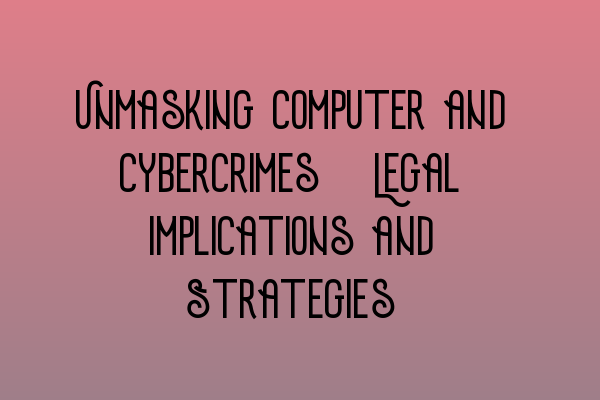Unmasking Computer and Cybercrimes: Legal Implications and Strategies
Welcome to SQE Criminal Law & Practice Law UK, where we help aspiring solicitors and legal professionals navigate the complex world of criminal law. In this blog post, we will delve into the intriguing realm of computer and cybercrimes, exploring their legal implications and strategies for addressing them effectively.
Understanding Computer and Cybercrimes
Computer and cybercrimes refer to illegal activities conducted through computer networks and digital platforms. These crimes encompass a wide range of offenses, including hacking, identity theft, fraud, phishing, data breaches, and more. The rapid advancement of technology has made our lives easier, but it has also opened the door to new opportunities for criminals to exploit the digital landscape.
To combat computer and cybercrimes effectively, it is crucial to understand the legal implications associated with these offenses. The law evolves constantly to keep up with technological advancements, and staying informed is essential for legal professionals to navigate this ever-changing landscape.
Legal Strategies for Addressing Computer and Cybercrimes
When dealing with computer and cybercrimes, it is important to adopt proactive legal strategies to prevent, investigate, and prosecute offenders. Here are some key strategies:
- Educating Clients and the Public: As legal professionals, it is our responsibility to educate our clients and the public about computer and cybercrimes. By raising awareness about potential threats and providing guidance on preventive measures, we can reduce the risk of individuals falling victim to these offenses.
- Developing Expertise: Staying up-to-date with the latest trends and technologies is crucial in effectively addressing computer and cybercrimes. By attending workshops and seminars on criminal practice, you can expand your expertise and gain insights from industry experts. Our Workshops and Seminars on Criminal Practice: Expanding Your Expertise article provides further information on how you can enhance your knowledge in this area.
- Keeping Abreast of Legislative Changes: Criminal laws evolve to accommodate emerging threats posed by computer and cybercrimes. It is crucial for legal professionals to stay informed and prepared by regularly updating themselves on the latest legislative changes. Our Updates in UK Criminal Laws: Staying Informed and Prepared article offers valuable information on how you can ensure you stay up-to-date.
- Building Effective Defense Strategies: When representing clients accused of computer and cybercrimes, developing effective defense strategies is paramount. Understanding the complexities of digital evidence and decoding criminal evidence rules is crucial in preparing a strong defense. For a detailed analysis on this topic, refer to our Decoding Criminal Evidence Rules: A Detailed Analysis article.
- Protecting Victims: While combating computer and cybercrimes, it is essential to ensure the rights and protection of victims. By understanding the legal protections and support available, legal professionals can play a vital role in advocating for victims of these offenses. Our Ensuring Rights of Victims in Criminal Procedures: Legal Protections and Support article provides insights into this important aspect.
Conclusion
Computer and cybercrimes pose significant challenges within the field of criminal law. By understanding the legal implications associated with these offenses and adopting effective strategies, we can combat these crimes more successfully.
At SQE Criminal Law & Practice Law UK, we are committed to enhancing your SQE criminal law study group experience and providing you with the knowledge and resources you need to excel in your legal career. Explore our Enhancing Your SQE Criminal Law Study Group Experience article to discover additional ways we can support your learning journey.
Stay tuned for more informative and insightful articles as we explore various aspects of criminal law and practice. Together, we can navigate the complexities of the legal world and work towards a safer and more secure digital landscape.
